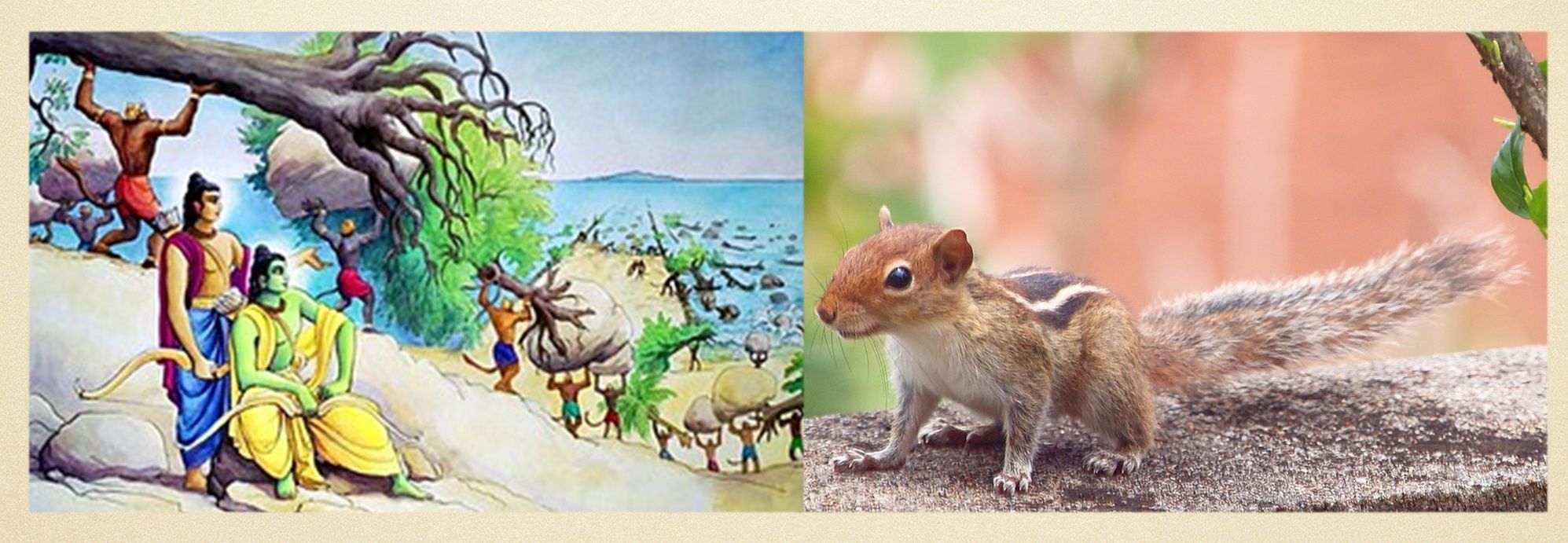‘My Squirrel Bit’ versus ‘My Vānara Might’

It is the quality of nature to throw problems on our paths. Whether we are a bee, a bird, a bear or a human being, all of us face difficulties in our lives. However, the kinds of difficulties and the degree of hardships that they cause vary. The variations may be of the intensity of the issue itself or it may be of the individuals facing them. One might have to face a flood that enters one’s home but will recede after a few days leaving things almost the same as they used to be earlier; in comparison, another’s home might crumble into a pile due to an earthquake. In response, the one whose house got inundated might cry and wallow in self-pity while the one who lost the entire house might just continue to work and look for alternative ways to solve the problems without feeling desperate or regretful.
There are also those problems which are common for society or to a section of society. These are meant to be solved collectively by the members of society. Some of these problems are relatively small. Such problems are usually such that are recognised and understood easily. It might be the issue of lack of roads in a village which can be solved by the villagers coming together, mobilizing funds and laying the roads. It might, on the other hand, be humongous problems. We are presently facing the problem of more and more people failing to grasp and adhere to dharma and this is a problem that must be solved collectively by those who are able to identify the presence of the issue. Now, the second question is the actual number or percentage of people who are aware of the presence of the issue; obviously, the greater the number of people who perceive an issue, the better is the possibility for the issue to be sorted out. The third difficulty is the number of people who are willing to do something about the issue. Finally, the number of people who do the actual work and the coordination between them in order for the work to yield a good outcome.
Sometimes, the second or third or fourth category of people are small and only a very small number of people end up having to take the burden of fighting the problem. At such times, we hear some people say, "let us all do our squirrel’s bit" implying that we must do whatever little bit that we can towards solving the issue as their bounden duty. The reference is to the story in the Rāmāyaņa where a squirrel (supposedly) helps as the Vānaras build a bridge for the army to cross the sea over to Laṅka. The story continues and says that when Rama noticed the squirrel’s act, he lovingly stroked it causing it to have the three white stripes on its back. This squirrel story is not part of the story in the original Rāmāyaņa. It is a later addition; yet, due to its sweetness (and primarily because the squirrel is a naturally adorable creature) it has grown very popular. It also serves to remind that one can do one’s might irrespective of whether one’s contribution is big or small. However, it does not mean that we have to do just a little bit (like a squirrel in relative size to a human) while we can do more than what we are doing. Yet, there are some who believe that doing just a little bit of what they are capable of doing for the society is sufficient while they continue to pump in great efforts for their own selfish and petty indulgence.
There is certainly the cumulative effect of the squirrels' bits and this one does not refute or wish to downplay even in the least. However, unless there was the Vānara sena, the squirrel's contribution - though well intended and well executed - would have been meaningless. A squirrel cannot build a bridge across the sea. Probably if lakhs of squirrels had come together at the behest of a powerful leader who could instruct all the squirrels to do their bit, the might have been built. Or, had the task been small enough, the squirrel (or a few squirrels) might have been successful.
The situation that we are in at present is similar to building bridges across the seas. Problems such as a faulty education system, deterioration of culture and values, discord within families, environmental imbalances, economic difficulties and several others need our intervention and work. Be it the magnitude of the problems, the size of the population for which we have to work, the magnitude of outcomes that we expect or any other parameter that we may want to measure with.
For us to do our "Squirrel Bit" would barely have an impact if our task is to move mountains of problems. One way is for there to be a leader instructing all of us to do our Squirrel Bit. But, in the human world of today, it would tantamount to authoritarian dictatorship.
We have to become Vānaras. The Vānaras had nothing petty to gain; they were able to see that to protect dharma was to protect themselves. They did not crave name, fame, monetary gain or anything material. Just like them, we must be prepared to move mountains of problems. First drop the fear and, thereby, the inhibition to work; at worst, we would give up our lives working for dharma. Through work, generate the awareness, push others to understand the reality which tends to be hidden behind glittering falsehood and fake narratives. Inspire many to join the transformative process. We must treat ourselves as powerful beings capable of carrying massive rocks broken from the mountain of the problem. Treat the rocks as Rāma Himself. Be disciplined in body and mind. Keep doing our duty uncomplainingly; for, to complain while doing our duty means that we do not to want to do our duty. To lessen the burden of body and mind, hold Rāma Nāma in our hearts; Rāma Nāma is bigger than even Rāma as Cirañjīvi Māruti proves. Then, we can, by our might, use the same rocks to build bridges across seas! Just do our Vānara might! Jai Śrī Rāma!
Jai Hind!

